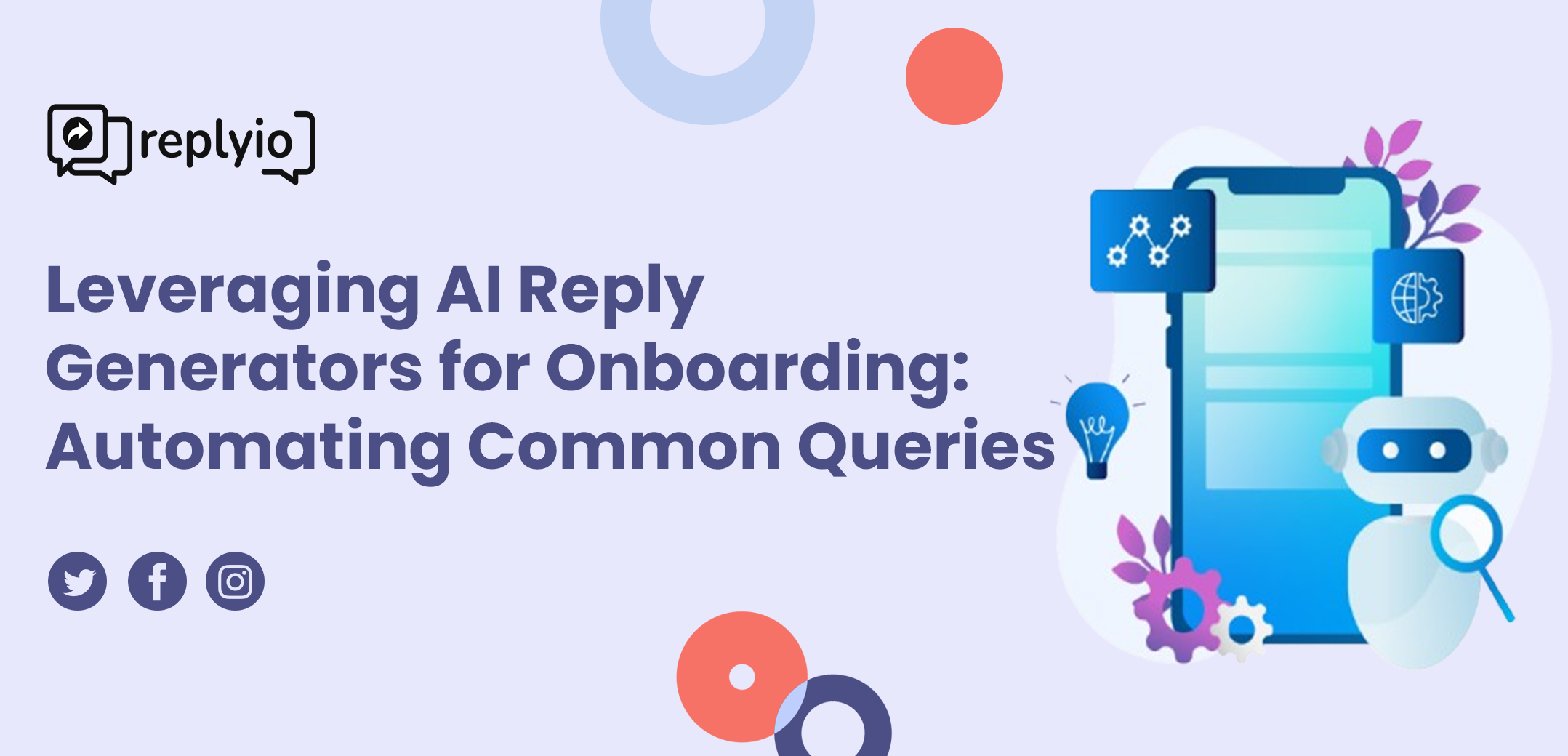Replyio
Leveraging AI Reply Generators for Onboarding: Automating Common Queries
-
Aug 24, 2024
-
11 min read

Onboarding new employees can be one of the most time-consuming tasks for any organization. From providing basic company information to answering endless questions about benefits, policies, and procedures, HR teams often find themselves stretched thin. Enter AI reply generators—a game-changing tool for automating responses to common queries during onboarding.
In this post, we'll explore how AI reply generators can streamline the onboarding process, improve efficiency, and enhance the experience for new hires.
Why AI Reply Generators?
AI-powered reply generators are designed to automate responses to frequently asked questions (FAQs) by analyzing and interpreting the questions posed by employees. Think of them as intelligent, automated helpers that can provide instant responses to routine queries, allowing HR teams to focus on more complex and strategic tasks.
Here are the main reasons why AI reply generators are perfect for onboarding:
1. Immediate Responses:
One of the biggest frustrations for new hires is waiting for answers to basic questions. With AI reply generators, queries can be answered in real time, reducing bottlenecks and enabling a smooth onboarding process.
2. Consistency in Communication:
AI ensures that every employee receives the same information, eliminating inconsistencies or miscommunications. No matter how many employees are onboarded at once, the AI reply generator will deliver uniform and accurate answers every time.
3. Reduced HR Workload:
Automating responses to common questions lightens the load for HR teams, allowing them to focus on more personalized onboarding activities, such as one-on-one sessions or team-building exercises. This also frees them up to address more complex issues.
4. 24/7 Availability:
Whether a new hire has a question at 2 AM or during standard office hours, AI reply generators are available 24/7. This provides flexibility and ensures that employees feel supported no matter when they need assistance.
Automating Common Queries: What Can AI Handle?
AI reply generators can tackle a wide variety of common onboarding questions, including but not limited to:
1. Company Policies:
“What’s the dress code?” or “How do I request time off?” These are standard questions that often don’t require a personalized response. AI can provide quick, accurate answers that employees can rely on.
2. Benefits and Compensation:
Questions like “How do I enroll in health benefits?” or “When will I get paid?” can be easily answered by AI, saving HR professionals time and effort.
3. IT and Access Issues:
New hires often struggle with setting up email accounts, accessing software, or navigating internal tools. AI reply generators can provide step-by-step instructions to solve these problems instantly.
4. Training and Development:
New employees might want to know more about required training programs or available courses. AI can guide them through the available resources and even provide links to relevant training materials.
5. Department-Specific FAQs:
Different departments may have their own onboarding processes, and AI reply generators can be programmed to handle specific departmental questions.
How to Implement AI Reply Generators in Onboarding
Implementing AI reply generators as part of your onboarding process is simpler than you might think. Here’s a quick guide to getting started:
1. Identify FAQs:
Start by identifying the most common questions your HR team receives during onboarding. These could range from policy-related queries to system access issues.
2. Train the AI:
Most AI reply generators use machine learning to improve their responses over time. However, it’s essential to start by training the system on your company's specific FAQs, policies, and resources.
3. Integrate with Your Onboarding Tools:
To maximize efficiency, integrate your AI reply generator with your existing onboarding software or tools. This ensures that the AI can access the right information to answer queries in real-time.
4. Monitor and Improve:
AI is only as good as the information it’s fed. Make sure to monitor the responses the AI is providing and update it regularly with new FAQs, policy changes, or onboarding materials.
5. Feedback Loop:
Encourage employees to provide feedback on the AI’s responses. This will help fine-tune the system and improve the accuracy of its answers.
AI Reply Generators: Enhancing the New Hire Experience
AI reply generators not only help HR teams but also improve the overall onboarding experience for new hires. Here’s how:
1. Increased Efficiency:
Faster responses mean that employees can get up to speed more quickly, without waiting for human intervention. This leads to a more productive and satisfying onboarding experience.
2. Personalized Experience:
While AI is often seen as impersonal, it can actually provide a more tailored experience by offering the specific information that employees need, when they need it. With the right training, AI can handle a wide variety of queries with a personal touch.
3. Reduced Anxiety:
For many new hires, asking multiple questions can feel overwhelming or burdensome. AI reply generators remove that barrier by providing quick, non-judgmental responses.
4. Empowerment:
Employees feel more in control of their onboarding experience when they can get answers immediately. This empowers them to take ownership of their role and become productive members of the team faster.
The Future of Onboarding with AI
AI reply generators are no longer just a nice-to-have—they’re becoming an essential tool for modern HR teams. By automating responses to common onboarding questions, companies can streamline the process, reduce the workload for HR, and provide a more efficient and enjoyable experience for new hires.
As AI technology continues to evolve, we can expect even more sophisticated reply generators capable of handling more complex queries and integrating seamlessly into every aspect of the onboarding process. It’s an exciting time for HR, and AI is at the forefront of this transformation.

